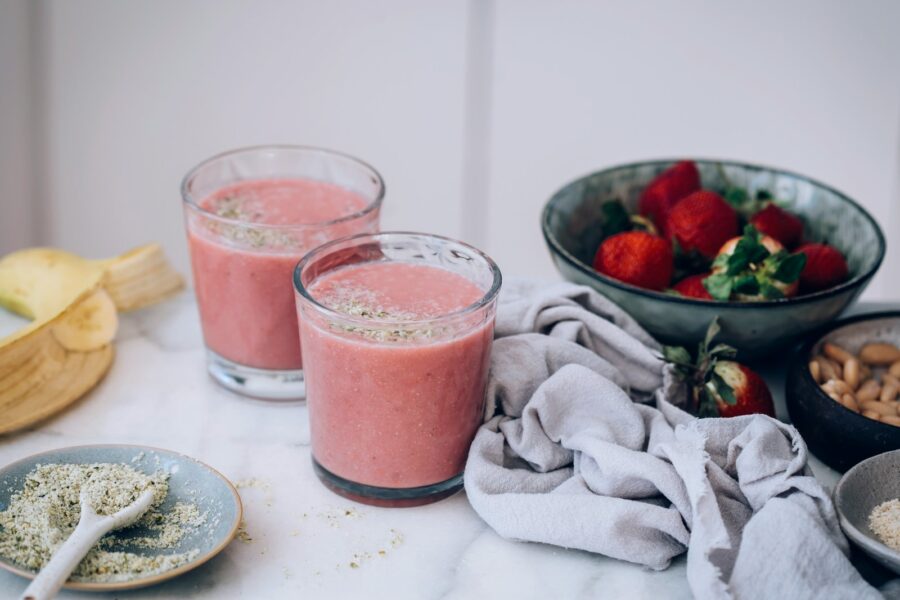Sometimes, when we look ahead to the day, the struggle is real! With so much on our daily “to do list”, how do we manage our energy levels and mood to get through the day?
The secret could lie in “supplement scheduling” to fit within a well-planned and balanced diet (incorporating 5 simple principles; fluid, protein, colour, fibre and healthy fat).
In a recent survey1 on setting wellbeing goals for 2024, the main outcomes people say they want to achieve are to increase energy levels (29%), boost mood and outlook on life (25%), reduce stress levels (24%) and improve sleep quality (24%). Almost a third (31%) of people have resolved to eat a more balanced or varied diet this year. So, the intention is there, but how do we make it a reality?
Here, we’ll go through a rundown of easy tips and tricks to help adapt our diet to balance hormones, nourish the body, plus improve mood and energy levels – what’s not to love?
Start the day (the right way)
In terms of consistency, the morning is a great time to schedule in your first supplement. Powdered sachets mixed into a hydrating drink (just add 250ml) are a fantastic way to start the day – I recommend a super supplement like Zest Active – with 25 active ingredients including beta-glucans, L Lysine, L Theanine and Taurine working together to power up your energy levels and support your immune system.
If you’re short on time (let’s face it, who isn’t?) you can also mix this supplement in a shaker and take it on the school run/dog walk/gym session/yoga class/commute/supermarket dash– delete as appropriate!
It’s essential to take a food-first approach to our diet – but what are the best choices to balance mood and energy throughout the day? Many traditional breakfast foods are either “beige” (think toast, cereal, pastry) or have high amounts of added sugar and salt. So, firstly, check the nutrition info / label, and secondly, add colour! We can only get vital phytonutrients from plant sources – each different colour and even each different plant has a unique combination of phytochemicals that work synergistically to support our overall health.
Here’s some quick ideas:
- Opt for porridge (oats are wholegrains that can help gut health thrive, lower cholesterol and keep you fuller for longer,) add in frozen berries (low in sugar), walnuts and sunflower seeds and finish with a dollop of kefir (fermented foods help support the gut microbiome for a healthy, happy gut!) If you are always in a hurry why not make overnight oats and take them with you?
- Nut butters are a great way to add protein, fibre and healthy fats to a slice of toast, top with sliced banana and a sprinkle of chia seeds for an ultimate energy-boosting slice.
- If time allows, whip up an omelette – mix 2 eggs with a handful of spinach leaves, red pepper, tomatoes and feta.
Break for lunch
A midday feast is an important way to put a pause on the day’s activity – so ideally take some time away from your laptop to eat & hydrate (water or herbal tea work well). If you’re lucky enough to be able to prep food in advance or heat-up where you’re working, try these ideas:
- Smoked salmon and beetroot salad
- Homemade soup (try my cost-of-living busting split pea and potato soup recipe) and wholemeal roll or pumpkin seed wholegrain crackers
- Jacket potato with tinned fish (sardines, mackerel, tuna, salmon etc) mixed with chopped veg (anything from celery, cucumber, olives, red onion to red, green or yellow peppers etc)
Many of us need to buy lunch on the go – from office workers to NHS staff – and the choice can be limited or oversupplied with nutrient-low, fast or ultra-processed foods in abundance.
However, in terms of optimising energy, any food is better than no food! If you’re selecting from ready-made lunches, then look for wholegrain breads, soups and daals or freshly-prepared sandwiches with added salad. And double-check ready-made foods and snacks that claim to be “high in protein” – they may contain processed ingredients not good for your health. If you have access to a local supermarket, choose items individually to “build” a nutritious lunch e.g. a cooked chicken breast, with a mixed bean salad.
The 3pm energy booster
The mid-afternoon “slump” is something many of us will be familiar with – that dip in energy and desperate need of a boost to help us power on to the end of the day. Sleep quality can massively affect our energy levels as the day proceeds, as can our hormones. So, for women with young children or for those experiencing peri-menopause or menopause, this time of day can be a real challenge. This is also a “danger zone” in terms of diet where we can be caught off guard with sugar or caffeine cravings, despite our best intentions and nutritious meal plans.
So, here’s my advice – on days that you’re really flagging, try swapping out the coffee and chocolate for a super supplement blend drink. Try Mastermind – it contains 11 active ingredients focused on supporting your brain, cognitive function and mental performance, as well as your nervous system. Each sachet contains 350mg of Omega 3, which can’t be made by the body so needs to be taken via diet or supplementation. It’s a great way to give you a hydration boost (we often mistake thirst for hunger) to help “fire you up” to take on the rest of the day. If you’re still looking for an actual mid-afternoon nibble, try a handful of almonds for a dose of healthy unsaturated fats, anti-inflammatory phytochemicals, fibre and Vitamin E.
Cook once, eat twice
In my experience, the evening meal is the one that many of us do “get right” more often than not in terms of nutrition. We often plan and prepare meals ahead and enjoy this meal together with the family, a partner or friends.
However, time is the enemy here and when we’re under pressure, all good intentions can go out of the window! Meal prep at weekends can help to alleviate this (and stop you from grabbing a last-minute pizza or ready-meal), as well as reducing your food bills. Good recipes to make in advance or batch cook to freeze include vegan chilli with sweet potato and black beans, ratatouille with aubergines and courgettes and slow-cooker meatballs with turkey mince.
Bon Appetit!

Wendy Hill
Wendy Hill,Revive ActiveBrand Ambassador, is a Nutritional Therapist and Nutrigenomics Practitioner, public speaker, yoga teacher, and health coach. With a wealth of expertise in these fields, she delivers insightful presentations to groups on topics including health, longevity, and menopause. Additionally,Wendyhosts her own weekly podcast titled Fab Female Nutrition, offering valuable insights and practical tips to her audience.


